Helmut Sonneberg: A spellbinder's story of survival, no longer kept secret
- Published

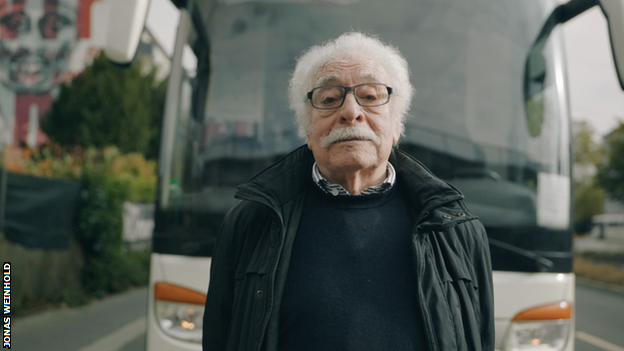
For years Sonny did not speak about his experiences during the Holocaust
Helmut Sonneberg usually gives the same answer whenever he gets asked how he is: "Even crappy would be sugar coating it."
People tend to be taken aback, but really there is no need to worry. 'Sonny', as he's known, is a bit of a rogue. In truth he's an amazingly fit and healthy 90-year-old. He's a warm-hearted, sensitive guy, and spellbinding in conversation.
I first met Sonny six years ago in his hometown of Frankfurt for a report on away-game supporters over the age of 80. He quickly launched into a passionate tirade that took in half a dozen different topics in about three minutes. I described him as "the Julius Caesar of grouchy pensioners" and he enjoyed the remark.
He smiled back: "Do you know what the hardest punishment would be for me? When I am told to keep quiet."
So in truth Sonny is anything but embittered, although his life story might easily have left him so.
Sonny is a Holocaust survivor. For decades he did not speak about the great suffering he experienced at the hands of the Nazis, not even with his closest friends and family.
That changed a few years ago. It was perhaps his greatest passion - football and Bundesliga side Eintracht Frankfurt in particular - that helped him find the words.

We should start with the night of 9 November 1938, Kristallnacht. Across Germany the Nazi regime and its supporters hunted Jews, burning their homes and pillaging their shops.
Sonny was an ordinary seven-year-old boy. His mother was Jewish and his father was too, although he left shortly after Sonny was born.
His surname (Wessinger) was his stepfather's, who was not Jewish. He didn't know about his birth father. That night he found out.
The family had watched as Frankfurt's synagogue went up in flames and Sonny's mother couldn't emotionally bear to tell him the truth. So it was a woman from the neighbourhood bakery who told him that he was different to the rest of his family, that the man he knew as his father was his stepfather, and that he himself was a Jew. "What is that?" replied Sonny.
"Jews are people who go to the synagogue, like the one you saw on fire today," the woman explained.
Sonny was forced away from his family and into an orphanage for Jewish children. He had to wear the yellow star of David that marked him out as "an enemy of the people". He was spat on in the street.
He would hear the horrifying chants of the Hitler Youth. Sometimes they were encouraged to indiscriminately beat the Jewish children. The sole relief in Sonny's world came from the books brought by his half-sister Lilo.
"I cried and cried," he says. "I would read day and night. It was my only refuge."
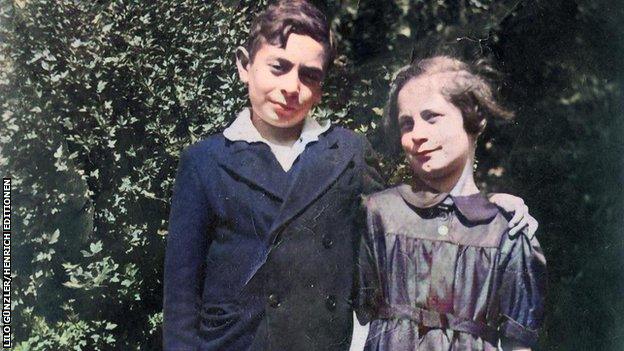
Sonny with his elder half-sister Lilo in 1943. He recalls he hid his yellow star of David in his pocket
When the Gestapo first came for Sonny his stepfather had resisted. In June 1943 he took them on once more, throwing down a box of his WWI medals as he demanded: "Give me back my son."
Remarkably, Sonny was allowed to return home. So on the night of 22 March 1944, when Frankfurt's entire old town was destroyed and over 1,000 citizens were killed in Allied bombing raids, he was sheltering with his family on the cellar floor.
"War really is the worst thing that can happen to the human race," Sonny says. "You saw things that night that one really cannot talk about. People lying in the street with no limbs."
In February 1945, with the Allies advancing, Sonny was deported along with his mother to Theresienstadt, in what is now the Czech Republic. His stepfather could do no more. He himself had been forced to take up arms.
Theresienstadt was primarily a transit camp for Jews sent to their deaths further east.
"There were about 55,000 people in a space designed for 4,000," Sonny says.
"There was barley soup in the morning, at noon and in the evening. That was all we got to eat. Sometimes it was thick, sometimes thin, salty or sweet. There was one special ration every five days: 500g bread, 50g sugar, 50g butter. If I got that at 11, it was eaten by 12. So my mother gave me her ration too.
"People were starving to death but it was not an extermination camp. When we were liberated by the Red Army - in late May or early June, it was warm - trains arrived from Auschwitz. They were like cattle cars, all the doors open, with people in there. They were just skin and bones. Nothing more.
"Some lay or knelt. Some stood. Doomed people who could move just a bit.
"That kind of image leaves an impression. If there are still people today who say that it was just made up... I am a fervent pacifist but I'd punch them in the face."
An emaciated Sonny weighed only 4.2 stone (27kg) when, as a 14-year old, he got back home to Frankfurt.
His older half-sister recoiled in horror at their first encounter. "I was afraid I would break him," she wrote in her memoirs, 'Endlich Reden' (Finally Talking).
Sonny still carries Theresienstadt with him in the haunting memories he will "never forget".
As tears come to his eyes he says: "People ask me can you forgive and can you forget? I tell you that I can forgive. And I'd like to forget. But the scars remain."

It was Matthias Thoma, director of the Eintracht Frankfurt club museum, who cautiously encouraged Sonny to speak about his early life.
Thoma is the author of the book 'Wir waren die Juddebube' (We were the Jewish boys). It tells the story of Eintracht's early nickname and the pre-war Jewish influence at the club.
When Sonny coincidentally met Thoma in 2007, Thoma was carrying the book and Sonny said to him: "Oh, I could tell you something about that."
They stayed in contact but Sonny did not feel ready to speak until 2017. Thoma had invited him to talk at an event about fan culture in the 1950s. Afterwards he said to Sonny: "Now you have to tell your whole story." Sonny made a start, and soon he began to open up more and more.
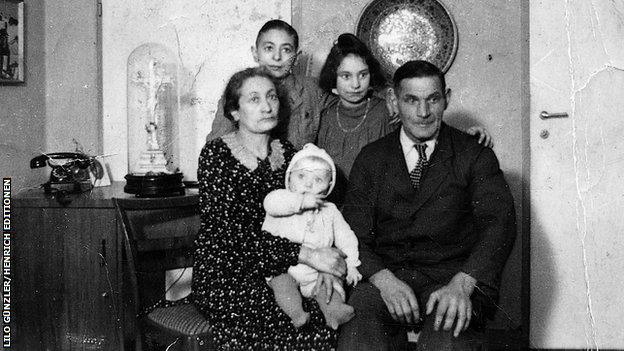
This picture was taken the day before Sonny and his mother were sent to Theresienstadt. She also survived, living until the age of 82. His stepfather died in 1970 aged 77
He says: "After the war, nobody talked about it. Nobody asked about it. At that time you only wanted one thing: to live."
Looking back on his life since the Holocaust, it seems like Sonny perhaps tried to move on by living as fast as he could.
He had 17 different jobs: for the fire brigade, as a taxi driver, unloading planes at the airport. He also opened several bars. But there was one job that brought him great self-worth; driving a mobile library that helped children from disadvantaged backgrounds access reading material in Frankfurt.
"For a long time in my childhood, from the age of seven to 14, I had zero friends. Books were my only friends," he says.
Then there was football. It gave him a "taste of freedom". And he could play.
Sonny joined Eintracht Frankfurt's youth ranks almost straight after the war. He quickly put on weight and didn't let the pain brought on by leg ulcers stop him either. He even broke into Eintracht's second team.
He fell in love with the club. He didn't make it as a player but following Eintracht became his great passion.
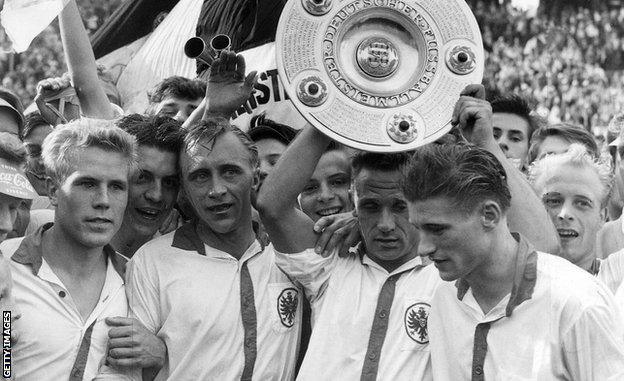
Eintracht's players celebrate winning the 1959 German championship
In 1959, Eintracht faced local rivals Kickers Offenbach in the German championship final in Berlin. Sonny travelled as a fan, driving in a VW Beetle.
When he and his friends crossed the West German border into East Germany, the customs officials told them not to stop until they reached the capital, but his beer-drinking companions had to pee.
Spotting them, a guard fired warning shots with his automatic rifle and they rushed back out of the bushes.
Eintracht won the title in a breathtaking 5-3 victory, with two goals in extra time.
"Eintracht Frankfurt had become my blood, my second family," says Sonny. "You had to be there to know what it meant to us."
It remains their only league title. The following year they reached the European Cup final and lost 7-3 to Real Madrid before a crowd of 127,000 at Hampden Park. Sonny still recalls the hospitality of the Scots with great fondness.
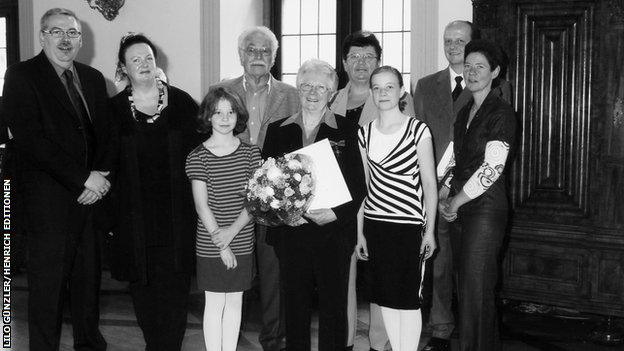
In this photo, to Sonny's left stands his younger half-sister Gerdi. Lilo is front and centre holding flowers
At that time, Frankfurt's chairman was Rudolf Gramlich. He'd been captain of the Germany team at the Berlin Olympic Games of 1936. It was that same year he joined the SS.
Sonny only found out about Gramlich's background in his "late 40s". He immediately ended his club membership.
Gramlich was Eintracht's chairman until 1970. After that he was made honorary president. He died in 1988.
"For such a man, a criminal and a killer who pretends to be an innocent lamb, to be involved in my club, my Eintracht, I could not accept that," Sonny says.
After WWII, Gramlich was arrested by the Americans over suspected war crimes before being released in 1947.
Eintracht Frankfurt is today well-known for their campaigns against discrimination, anti-Semitism and fascism.
As part of their efforts to mark the 75th anniversary of the liberation of Auschwitz-Birkenau on Holocaust Memorial Day 2020, the club commissioned research into Gramlich's past and stripped him of the honorary title.
The club's current president is Peter Fischer.
"Sonny is somebody who always gives me inner strength," he says.
"He's one of the survivors of the disgusting Nazi killing machine. They killed millions and unfortunately only a few are left of those who survived.
"One of them is Sonny. You can touch him, he's here, you can have a beer with him and he will tell you exactly what happened.
"He gives me the strength as president to say we are 100% clear in our principles - and we won't move a millimetre."

In early 2022, Sonny was the subject of our 30-minute Hessischer Rundfunk documentary film, external called 'A story about the Holocaust, Unity (Eintracht) and Frankfurt'
When Sonny sat in the car after one of the five days of shooting, exhausted after a phenomenal endeavour for a 90-year-old and on the road back to his beloved partner Emmi, he said: "I say thanks to God every day when I wake up.
"Thank you that I see the sky, the moon, the weather, feel the rain on my skin. That's great fun for me.
"But I absolutely have to live to 104 years old, to get back what I've paid into the pension fund. I've calculated it.
"I know a lot of people of my age who have already passed. I don't know really why I am still here.
"Maybe God thinks that, after all that pain, he owes me some years of life."
Allow YouTube content?
This article contains content provided by Google YouTube. We ask for your permission before anything is loaded, as they may be using cookies and other technologies. You may want to read Google’s cookie policy, external and privacy policy, external before accepting. To view this content choose ‘accept and continue’.
The BBC is not responsible for content on third-party sites